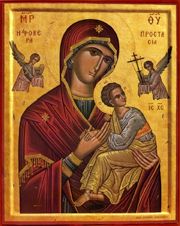With the popularity of the ‘Left Behind’ series, much end time speculation is taking place. S79 gives us something to chew on that is buzzing around (ultra?)conservative Catholic circles. Here’s what he said:
“Saint Malachi of Ireland was born in Armagh, Ireland in 1094 and died in 1148. He became very well known on account of the prophecies he allegedly made regarding 112 future popes, while on a trip to visit to Pope Innocent II in Rome in 1139-40.
The prophecies concern the papacy. A total of 112 popes are listed, each in a very brief description, from 1143 (Celestine II) to the “end of the world“ (Peter the Roman). These short prophetical announcements indicate some noticeable trait of all future popes: their country, their name, their coat of arms or insignia, their birth-place, their talent or learning, the title of their cardinalate, the dignities which they held etc.
Pope John Paul II is said to be De labore Solis (“from the labor of the sun”). He was born during the solar eclipse of May 18th, 1920.
Pope Benedict XVI is named Gloria olivae (“The Glory of the Olive”). This Pope will reign during the beginning of the tribulation Jesus spoke of.
The last of these prophecies concerns the end of the world and is as follows: “In the final persecution of the Holy Roman Church there will reign Peter the Roman, who will feed his flock amid many tribulations, after which the seven-hilled city will be destroyed and the dreadful Judge will judge the people. The End.”
This final Pope, it is argued now by theologians, is likely be Satan, taking the form of a man named Peter who will gain a worldwide allegiance and adoration. He will be the final antichrist which prophecy students have long foretold.
Do you think God would allow this to happen to his church?
Your thoughts?”
I know that some dispy fundies have predicted that the office of pope would bring the anti-christ. I tend to interpret the end-times passages of Scripture with more of a ‘preterist’ grid, meaning many of them were fulfilled with the early persecutions and the 1st and 2nd Century Roman Empire. Having said that, I also think that prophecy has a way of ‘double fulfilling.’ For example, many of Isaiah’s prophecies have ‘double fulfillment,’ i.e they were fulfilled in Isaiah’s day and by the person of Christ. So, a number of scenarios could take place. However, when Christ says the ‘gates of hell will not prevail’ against the church, I believe him. I can’t see the antichrist in the see or seat of Peter. I tend to see antichrist more as a ‘system.’ Western secularism and Islam might make better candidates.





